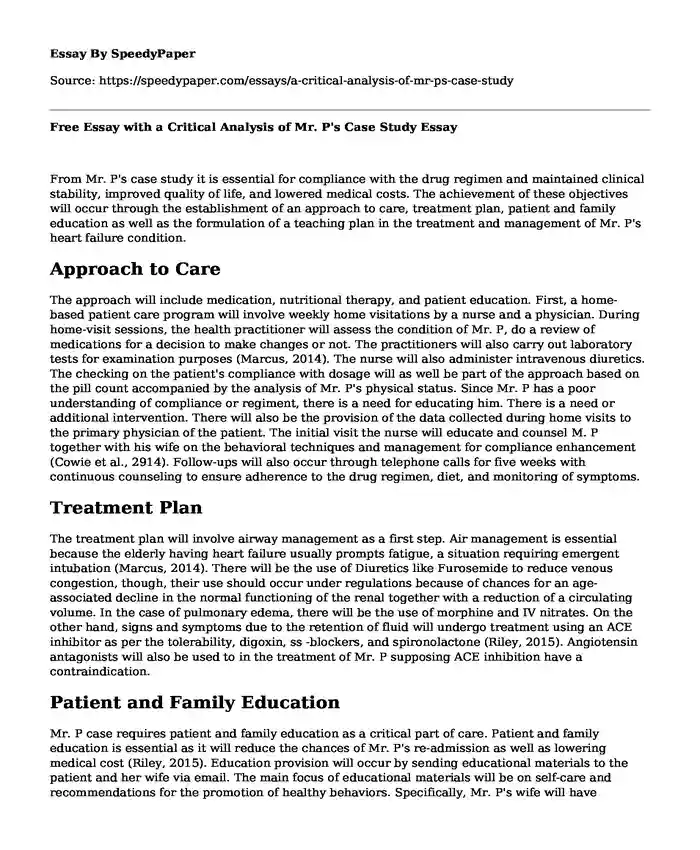
| Essay type: | Critical analysis essays |
| Categories: | Education Healthcare |
| Pages: | 3 |
| Wordcount: | 803 words |
From Mr. P's case study it is essential for compliance with the drug regimen and maintained clinical stability, improved quality of life, and lowered medical costs. The achievement of these objectives will occur through the establishment of an approach to care, treatment plan, patient and family education as well as the formulation of a teaching plan in the treatment and management of Mr. P's heart failure condition.
Approach to Care
The approach will include medication, nutritional therapy, and patient education. First, a home-based patient care program will involve weekly home visitations by a nurse and a physician. During home-visit sessions, the health practitioner will assess the condition of Mr. P, do a review of medications for a decision to make changes or not. The practitioners will also carry out laboratory tests for examination purposes (Marcus, 2014). The nurse will also administer intravenous diuretics. The checking on the patient's compliance with dosage will as well be part of the approach based on the pill count accompanied by the analysis of Mr. P's physical status. Since Mr. P has a poor understanding of compliance or regiment, there is a need for educating him. There is a need or additional intervention. There will also be the provision of the data collected during home visits to the primary physician of the patient. The initial visit the nurse will educate and counsel M. P together with his wife on the behavioral techniques and management for compliance enhancement (Cowie et al., 2914). Follow-ups will also occur through telephone calls for five weeks with continuous counseling to ensure adherence to the drug regimen, diet, and monitoring of symptoms.
Treatment Plan
The treatment plan will involve airway management as a first step. Air management is essential because the elderly having heart failure usually prompts fatigue, a situation requiring emergent intubation (Marcus, 2014). There will be the use of Diuretics like Furosemide to reduce venous congestion, though, their use should occur under regulations because of chances for an age-associated decline in the normal functioning of the renal together with a reduction of a circulating volume. In the case of pulmonary edema, there will be the use of morphine and IV nitrates. On the other hand, signs and symptoms due to the retention of fluid will undergo treatment using an ACE inhibitor as per the tolerability, digoxin, ss -blockers, and spironolactone (Riley, 2015). Angiotensin antagonists will also be used to in the treatment of Mr. P supposing ACE inhibition have a contraindication.
Patient and Family Education
Mr. P case requires patient and family education as a critical part of care. Patient and family education is essential as it will reduce the chances of Mr. P's re-admission as well as lowering medical cost (Riley, 2015). Education provision will occur by sending educational materials to the patient and her wife via email. The main focus of educational materials will be on self-care and recommendations for the promotion of healthy behaviors. Specifically, Mr. P's wife will have education on the risk of developing the disease. There will also be the assessment of the wife's health history in the determination of her risk to contract the illness because of hypertension (Cowie et al., 2014). Also, there will be education on exercise, activity, associated symptoms, dietary, medications, and recommendations to Mr. P and his wife.
The Teaching Plan
The education to Mr. P and his wife will follow a definite teaching plan following these steps. The first step of the teaching plan will be ensuring an understanding of the signs and symptoms of heart failure (Marcus, 2014). The symptoms will be the main topic of teaching because most of the patients do not understand the signs of heart failure. In the teaching sessions, there will be clarifications on the expected symptoms and signs of the heart failure disorder. There will also be plans for watching videos concerning heart failure and cardiomyopathy for Mr. P and his wife. Counseling sessions will as well be part of the plan where the patient and his wife will have counseling session on dietary behaviors, exercises, and activity. Lastly, the patients together with the wife will have lessons on the purpose of medications used, their dosage, side-effects, and frequency (Cowie et al., 2014). There will also be a written schedule of medications used by Mr. P to lower adverse effects of polypharmacy and increase compliance.
References
Cowie, M., Anker, S., Cleland, J., Felker, G., Filippatos, G., & Jaarsma, T. et al. (2014). Improving care for patients with acute heart failure: before, during and after hospitalization. ESC Heart Failure, 1(2), 110-145. doi: 10.1002/ehf2.12021
Marcus, C. (2014). Strategies for improving the quality of verbal patient and family education: a review of the literature and creation of the EDUCATE model. Health Psychology And Behavioral Medicine, 2(1), 482-495. doi: 10.1080/21642850.2014.900450
Riley, J. (2015). The Key Roles For The Nurse In Acute Heart Failure Management. Cardiac Failure Review, 1(2), 123. doi: 10.15420/cfr.2015.1.2.123
Cite this page
Free Essay with a Critical Analysis of Mr. P's Case Study. (2022, Oct 19). Retrieved from https://speedypaper.net/essays/a-critical-analysis-of-mr-ps-case-study
Request Removal
If you are the original author of this essay and no longer wish to have it published on the SpeedyPaper website, please click below to request its removal:
- Essay Sample on Critical Congenital Heart Defects before Discharge
- Cultural Identity and Well-Being - Free Essay Sample
- Essay Sample on the Film, Finding Nemo
- Can the Global South Attain Food Security Without the Green Revolution? Essay Sample
- Free Essay Example on Improving Healthcare for the Elderly
- Personalized Healthcare. Free Essay Example.
- Free Essay: Personal History and Career Plans
Popular categories




